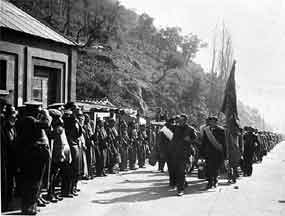 James O'Keefe's videotaped investigation of ACORN (Association of Community Organizations for Reform Now) circulated in mainstream media and ultimately lead to the government defunding the organization. O'Keefe, now the author of several such pieces, sees himself as embattled and his work undercut by an elite media class too ignorant or dishonest to recognize their own liberal bias. The primary criticism of his work claims that he selectively edits his videos to serve an agenda, ultimately misrepresenting the facts. But he fires back, pointing out that all media is edited; no story runs in The New York Times and no tape rolls on CNN without having been cut to highlight the action, to fit the time allotted, and to hold our interest.
James O'Keefe's videotaped investigation of ACORN (Association of Community Organizations for Reform Now) circulated in mainstream media and ultimately lead to the government defunding the organization. O'Keefe, now the author of several such pieces, sees himself as embattled and his work undercut by an elite media class too ignorant or dishonest to recognize their own liberal bias. The primary criticism of his work claims that he selectively edits his videos to serve an agenda, ultimately misrepresenting the facts. But he fires back, pointing out that all media is edited; no story runs in The New York Times and no tape rolls on CNN without having been cut to highlight the action, to fit the time allotted, and to hold our interest.I imagine a Times editor arguing that, in the paper, he edits for clarity, consistency, readability--qualities that serve not to obscure or spin but, rather, to make the facts more accessible, to make them clear. But clarity of narrative is itself a fiction, and order largely an invention of the mind. O'Keefe has a point.
He is currently profiled in The New York Times piece "Stinger: James O'Keefe's Greatest Hits", a well-written, brief and dispassionate study of the young advocate journalist. Its author, Zev Chafets, closes with this question about O'Keefe's investigations:
An interesting and ironic conclusion. The larger, unspoken theme to this story is advocacy in journalism. Media criticism today takes aim at mainstream journalists' unwillingness or inability to call out bullshit where it exists; O'Keefe himself has echoed Liberal media critics by calling journalists "stenographers". Yet, in the very face of that criticism, Chafets casually poses here two charges, detonating neither, leaving readers perhaps less certain of where, how, and if a guy like O'Keefe fits in the fractured snow globe of our doomed national politics.Had the videos revealed a larger injustice, O’Keefe’s stated goal? Had they demonstrated waste and abuse in Great Society initiatives run amok, or were they simply exposing the failures of some well-meaning, low-level bureaucrats in a basically worthy government program? It depends on your perspective. As for James O’Keefe, he is already looking for the next target.
Few people doubt that at times we need journalism that aims to get the facts straight, nothing more, nothing less. But at these times, in cases like this, we need a journalism that does what O'Keefe says he does: Speak truth to Power. No journalist covering O'Keefe should have to ask himself if advocates for the poor constitute Power. If he does, I might ask myself, Is Chafets stupid or just a coward?










